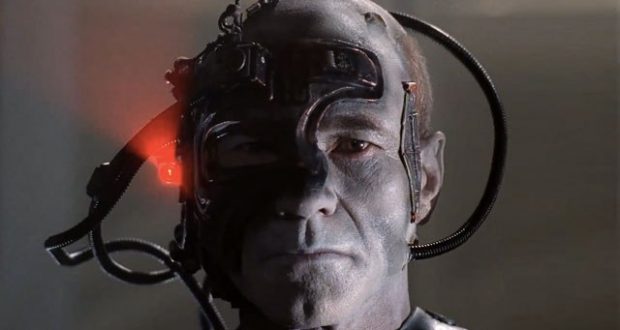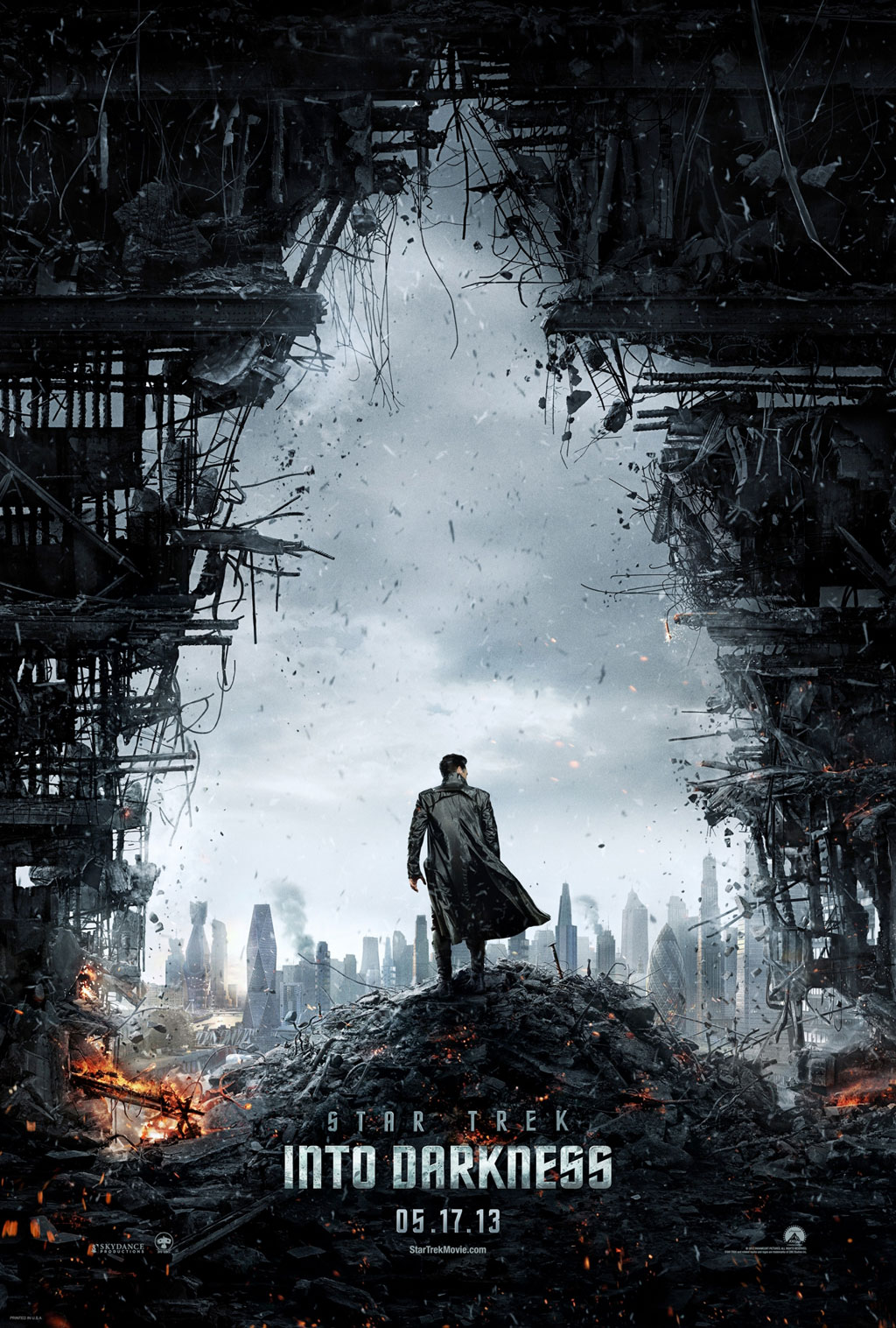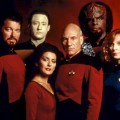I know, I know, I need to stop re-watching the same shows and make time to tick off some titles on my enormous to-watch list. But sometimes an old favourite is the only thing that will hit the spot… which is why I find myself re-watching Star Trek: The Next Generation for the umpteenth time. And something struck me as I was watching the classic (and supremely influential – see my article on the sadistic trends of contemporary TV) episode ‘Best of Both Worlds’ where the crew of the Enterprise are facing the worst of foes: the Borg.
The Borg are a terrifying foe, outclassing the Federation in almost every way. They have better technology and more bodies to throw into a fight. Not only that, their technology is able to quickly adapt to whatever the Federation throws at them. Ever since I first encountered the Borg, I’ve had the same question… if phasers won’t work, why don’t they just carry axes? Use brute force! If you cannot look to the future to defeat your foes, look to the past.
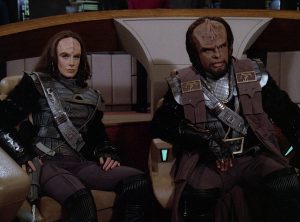 This stuck out to me. In every other instance, Star Trek unilaterally champions the past as a valuable experience. The reboot of Battlestar Galactica had the right idea in battling the high-tech foe with a low-tech relic of a time long past. The Cylons could easily penetrate any networks of hi-tech defensive grids the colonies established, but there were no easy solutions to facing bullets, explosives and grit. Why didn’t the Enterprise give it a go? Why keep firing lasers when you know they won’t be effective for long? Pick up an axe! Drop a grand piano on their heads! Try literally *anything* else. But within the world of Star Trek, they are too blinkered by the technology they take for granted to think about such pedestrian defence mechanisms as ‘throw heavy objects at it!’ or ‘cut him up!’
This stuck out to me. In every other instance, Star Trek unilaterally champions the past as a valuable experience. The reboot of Battlestar Galactica had the right idea in battling the high-tech foe with a low-tech relic of a time long past. The Cylons could easily penetrate any networks of hi-tech defensive grids the colonies established, but there were no easy solutions to facing bullets, explosives and grit. Why didn’t the Enterprise give it a go? Why keep firing lasers when you know they won’t be effective for long? Pick up an axe! Drop a grand piano on their heads! Try literally *anything* else. But within the world of Star Trek, they are too blinkered by the technology they take for granted to think about such pedestrian defence mechanisms as ‘throw heavy objects at it!’ or ‘cut him up!’
In reality, it is likely they were restricted by their PG rating. As a family-appropriate show that occupied a mainstream slot on TV, TNG was never going to show graphic physical violence. As a result, they defer to sterile phaser shooting and bloodless stage fighting. No gore here. But as a result of this restriction, we see a disjunction. In every other way, the characters and writers of this show championed a knowledge and appreciation of the past to guide their present. The importance of history, of telling stories, and upholding traditions are important themes throughout the series, as well as its counterparts.
Learning from the past
History has proven again and again that whenever mankind interferes with a less developed civilization, no matter how well intentioned that interference may be, the results are invariably disastrous.
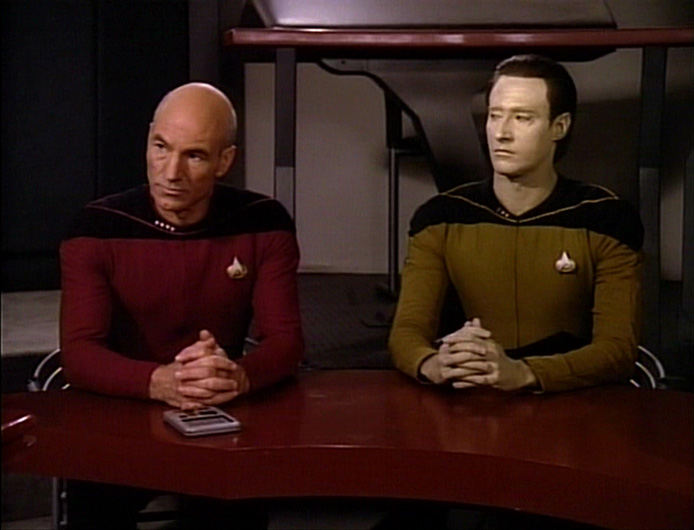 Star Trek often takes cues from our past, particularly in The Next Generation. Picard fancies himself a student of history and likes to use historical examples to argue his point, often for humanitarian causes. After all, humanity has seen almost every kind of appalling behaviour in our stories past. We’ve made terrible mistakes and seen what pain they bring. Learning from our mistakes is incredibly important. For instance, when the episode narrative involves the infringement of civil liberties or normalising prejudice, such as Season 2’s ‘The Measure of a Man’ or ‘The Outcast’ from Season 5. ‘The Measure of a Man’ was actually a spec script written by Melinda Snodgrass, the strength of which landed her a full-time staff writer gig on the show for two seasons. The episode looks at Data’s civil rights, with Picard arguing his case and referencing civil rights issues of the past.
Star Trek often takes cues from our past, particularly in The Next Generation. Picard fancies himself a student of history and likes to use historical examples to argue his point, often for humanitarian causes. After all, humanity has seen almost every kind of appalling behaviour in our stories past. We’ve made terrible mistakes and seen what pain they bring. Learning from our mistakes is incredibly important. For instance, when the episode narrative involves the infringement of civil liberties or normalising prejudice, such as Season 2’s ‘The Measure of a Man’ or ‘The Outcast’ from Season 5. ‘The Measure of a Man’ was actually a spec script written by Melinda Snodgrass, the strength of which landed her a full-time staff writer gig on the show for two seasons. The episode looks at Data’s civil rights, with Picard arguing his case and referencing civil rights issues of the past.
The significance placed on learning from mistakes is further highlighted with the wise old mentor of the series: Guinan. The audience is told that Guinan is old – you know what I mean, Yoda style old. She has experience of the universe that the naïve humans can only dream of. She’s familiar with Q and the Borg long before the Enterprise ever encounters them. As such, Picard often turns to her for advice, despite her official title being nothing more than bartender. But with experience comes wisdom.
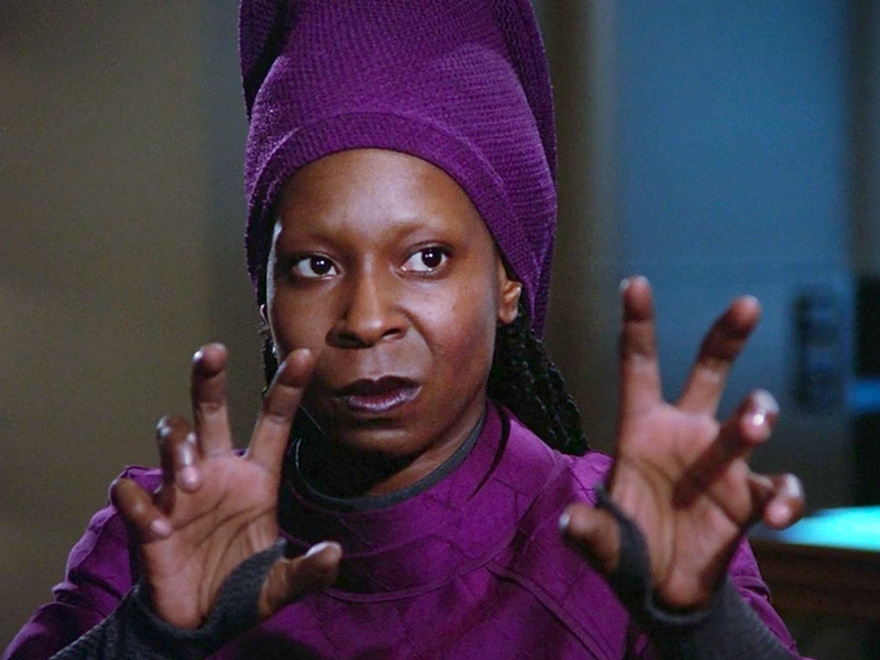 One of the most celebrated episodes of the series is ‘The Inner Light’ (Season 5), where Picard experiences the memories from another man’s entire life after colliding with a probe. As one would, Picard learns a great deal from this ‘other’ life and appreciates the desire behind the probe’s creation. They want only to be remembered and that their lives may help others learn. History is, after all, just the written lessons of the past. Whether we choose to learn from it is another matter.
One of the most celebrated episodes of the series is ‘The Inner Light’ (Season 5), where Picard experiences the memories from another man’s entire life after colliding with a probe. As one would, Picard learns a great deal from this ‘other’ life and appreciates the desire behind the probe’s creation. They want only to be remembered and that their lives may help others learn. History is, after all, just the written lessons of the past. Whether we choose to learn from it is another matter.
We hoped our probe would encounter someone in the future. Someone who could be a teacher. Someone who could tell the others about us.
Celebrating the past
It is a good day to die, Duras. And the day is not yet over.
History, framed in terms of cultural traditions, is also regularly championed in Star Trek: The Next Generation. Celebrating cultural traditions is particularly indulged when it comes to the Klingon Empire whenever there is a Worf-centric episode, such as ‘Sins of the Father’ (Season 3), an episode that shows reverence to traditions while also acknowledging that times do change. Smaller traditions are used as a quick characterisation win for Worf, such as when he invites other crew members to share his more traditional callisthenics programme in the holodeck or when he performs a traditional Klingon funeral rite after a boy loses his family (‘The Bonding’, Season 3). Even Lwaxana Troi, although in a more light-hearted fashion, likes to champion her heritage and the traditions of her family and culture (‘Ménage à Troi’, Season 3):
Lwaxana: Doesn’t he realise that I am the daughter of the Fifth House of Betazed? Holder of the Sacred Chalice of Rixx?
Deanna: The Sacred Chalice of Rixx is an old clay pot with mould growing inside it.
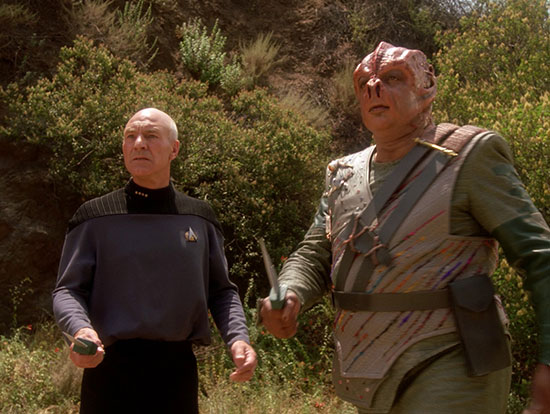 Before Picard is kidnapped by the Borg in the classic ‘Best of Both Worlds’ season finale, he talks to Guinan about history being yet another kind of story (‘This is just another page in history, isn’t it?’). A theme that is similarly picked up on in another fan (and critic) favourite, the episode ‘Darmok’ (Season 5). In this episode, the Enterprise encounters a species who use storytelling as a means of communication. But without a frame of reference, they are unable to communicate. And yet, the power of story manages to overcome this barrier. The episode is centred around Picard and his attempts to communicate to the Tamarian around a campfire, recalling great oral storytelling traditions of the past.
Before Picard is kidnapped by the Borg in the classic ‘Best of Both Worlds’ season finale, he talks to Guinan about history being yet another kind of story (‘This is just another page in history, isn’t it?’). A theme that is similarly picked up on in another fan (and critic) favourite, the episode ‘Darmok’ (Season 5). In this episode, the Enterprise encounters a species who use storytelling as a means of communication. But without a frame of reference, they are unable to communicate. And yet, the power of story manages to overcome this barrier. The episode is centred around Picard and his attempts to communicate to the Tamarian around a campfire, recalling great oral storytelling traditions of the past.
But are they truly incomprehensible? In my experience, communication is a matter of patience, imagination. I would like to believe that these are qualities that we have in sufficient measure.
Star Trek, like much of the best science fiction, tackles issues of our past in the guise of a futuristic setting. And why not? Recent events have shown us that we’re not all that good at learning from our mistakes. Perhaps we all need a new Star Trek series to remind us about the importance of history and learning from our mistakes. Will Star Trek: Discovery deliver on this front? We’ll have to wait and see. Not long to go now…
 Pop Verse Pop Culture Universe
Pop Verse Pop Culture Universe
